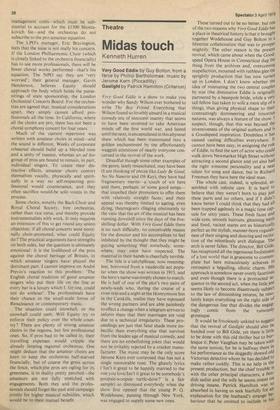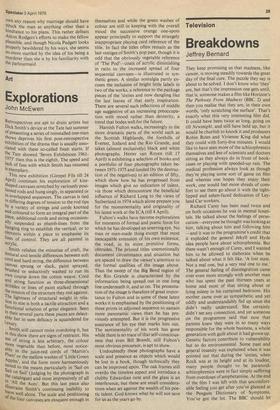Theatre
Midas touch
Kenneth Hurren
Very Good Eddie by Guy Bolton, from a farce by Phillip Bartholomae; music by Jerome Kern (Piccadilly) Gaslight by Patrick Hamilton (Criterion)
Very Good Eddie is a show to make you wonder why Sandy Wilson ever bothered to write The Boy Friend. Everything that Wilson found so lovably absurd in a musical comedy era of innocent inanity that seems to have been invented to take American minds off the first world war, and lasted until the next, is encapsulated in this abysmal show which has been transmuted into a golden enchantment by the affectionately waggish attentions of nearly everyone con- cerned in the revival of the work.
Dreadful though some other examples of the genre, lately resuscitated, may have been (I am thinking of pieces like Lady Be Good, No No Nanette and Oh Kay), they have had fragmentary merits—a touch of wit here and there, perhaps, or some good songs— that impelled their promoters to offer them with relatively straight faces; and their appeal was thereby limited to ageing, even dying, theatregoers clinging obstinately to the view that the art of the musical has been running downhill since the days of the five- shilling dollar. With Very Good Eddie there is no such difficulty, no conceivable reason for the director and his accomplices to feel inhibited by the thought that they might be guying something that somebody, some- where, may once have respected. The material in their hands is cheerfully terrible.
The title is a catchphrase, now meaning- less, borrowed from a vaudeville act popu- lar when the show was written in 1915, and the hero's name was simply chosen to match. He is half of one of the plot's two pairs of newly-weds who, during the course of a river-trip and a night at the Honeymoon Inn in the Catskills, realise they have espoused the wrong partners and are able painlessly to effect a change when a telegram arrives to inform them that their marriages are void due to a technical irregularity. These pro- ceedings are just that fatal shade more im- becilic than everything else that survives from the leaden age of musical comedy, and there are no embellishing jokes that would not be irritably rejected by a cracker manu- facturer. The music may be the only score Jerome Kern ever composed that has not a single memorable tune. The ghastly lyrics ('Isn't it great to be happily married to the one you love/Isn't it great to be somebody's poopsie-woopsie turtle-dove?' is a fair sample) so distressed everybody when the show first opened that the young P. G. Wodehouse, passing through New York, was engaged to supply some new ones.
These turned out to be no better, but one of the two reasons why Very Good Eddie has a place in theatrical history is that it brought together Wodehouse and Guy Bolton in a librettist collaboration that was to prosper mightily. The other reason is the present revival, which came about when the Good- speed Opera House in Connecticut dug the thing from the archives and, overcoming stupefaction, mounted with ruthless glee the sprightly production that has now turned up in London. I don't know whether the idea of mismating the two central couples by size (the diminutive Eddie is originallY partnered by a beanpole bride, while a verY tall fellow has taken to wife a mere slip of a thing), thus giving physical shape to their contrastingly domineering and timorous natures, was always a feature of the show. I suspect, though, that this was beyond the inventiveness of the original authors and is a Goodspeed inspiration. Doubtless it has caused casting difficulties everywhere. It cannot have been easy, in assigning the role of Eddie, to find the sort of actor who could walk down Newmarket High Street without attracting a second glance and yet also had the right winsome personality and a neat talent for song and dance, but in Richard Freeman they have here the ideal man.
The whole cast, indeed, is splendid, as- sembled with infinite care. It is hard to believe that they weren't born to play just these parts and no others, and if I didn t know better I could think that they had all been trapped agelessly in a magic time caP- sule for sixty years. These fresh faces and wide eyes, smooth haircuts, gleaming teeth and fixed, vacant stares are as historicallY perfect as the stylish, manner-born roguish- ness of their singing and dancing and recita- tion of the relentlessly arch dialogue. The arch is never fallen. The director, Bill Gicie, has recaptured all the ingenuous foolishness of a lost world that is gruesome to contem- plate but here miraculously achieves in retrospect a beguiling, idiotic charm. His approach is somehow never overly facetious and even though there is a protracted se- quence in the second act, when the little jest seems likely to become disastrously subject to the law of diminishing returns, he reso- lutely keeps everything on the right side of the dangerous line that divides the engag" ingly comic from the ruinously grotesque. It would be frivolously unkind to suggest that the revival of Gaslight should also be handed over to Bill Gide, yet there is little to be done with this old thriller but to bur- lesque it. Peter Vaughan may be taken with the same notion, for he is halfway there In his performance as the doggedly shrewd old Victorian detective whom he has decided to make rather cuddly. This is no help in the present production, but the chief trouble Is with the other principal characters, a fien- dish sadist and the wife he seems intent on driving insane. Patrick Hamilton was s° absorbed in having us seek fearfully for an explanation for the husband's strange haviour that he omitted to include In his
own any reason why marriage should have struck the man as anything other than a hindrance to his plans. This rather defeats Anton Rodgers's efforts to make the fellow Plausible, and though Nicola Padgett looks properly bewildered by his ways, she seems no .more startled by the idea of his being a murderer than she is by his familiarity with the parlourmaid.



































 Previous page
Previous page